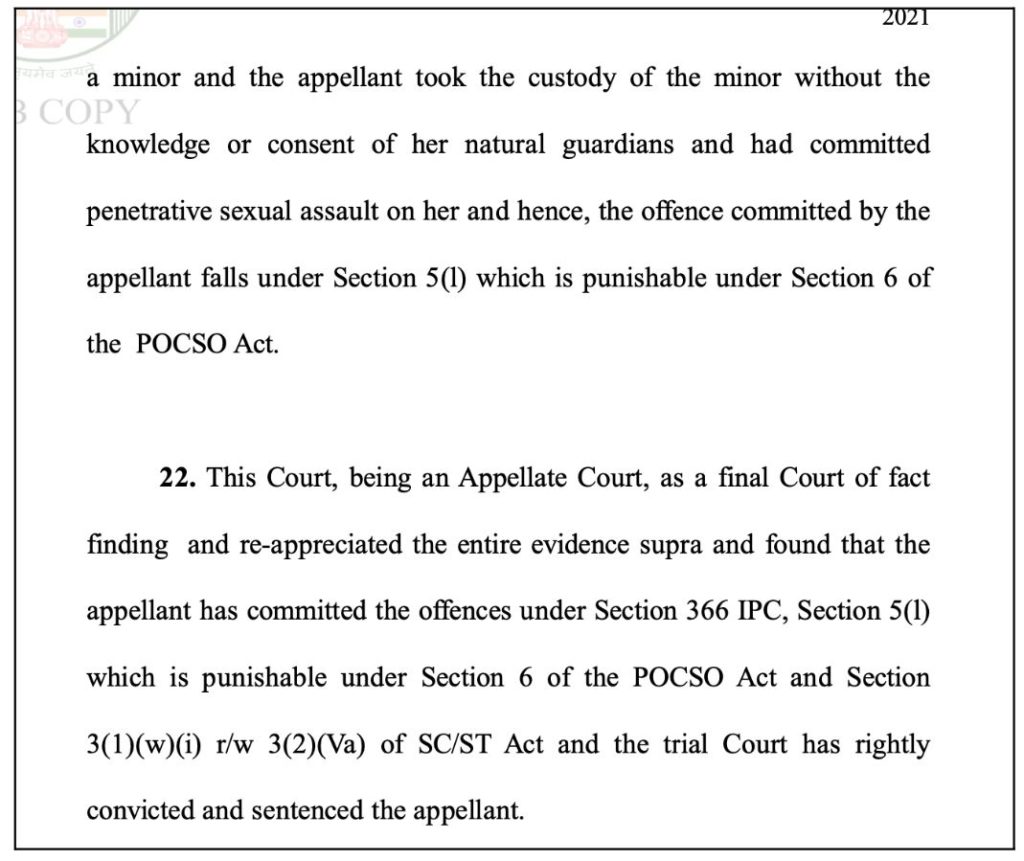In this week’s review of Court Judgments, we look at the Supreme Court’s plea to the Central government to bring in amendments to the survivorship rights of tribal women, Delhi High Court’s judgment that the mother’s choice & quality of the unborn child’s life to be deciding factors for abortion, and it’s judgment to de-seal a property, Allahabad court’s denial of bail application of a rape accused and Madras High Court upholding the sentence under POCSO Act.
Delhi HC: Mother’s choice & quality of unborn child’s life deciding factors for final decision for abortion
In the case Mrs. X vs. GNCTD & Anr, Delhi High Court ruled that the mother has the ultimate choice in pregnancy cases involving foetal abnormalities and also emphasised that the medical boards must give qualitative reports in such cases.
The petition was filed by a 26-year-old married woman seeking medical termination of the foetus over 33 weeks suffering from cerebral abnormalities. In the petition, the woman stated that although she underwent various ultrasounds since the inception of her pregnancy, a cerebral abnormality was found in the foetus only on 12 November 2022. This abnormality was confirmed by another ultrasound couple of days later.
The court stated that the right of a pregnant woman to terminate her pregnancy or abort the foetus is a subject matter of debate across the world. India is among the countries that recognises the choice of the woman in its law and have recently also amended the law permitting the termination at an advanced stage under certain circumstances.
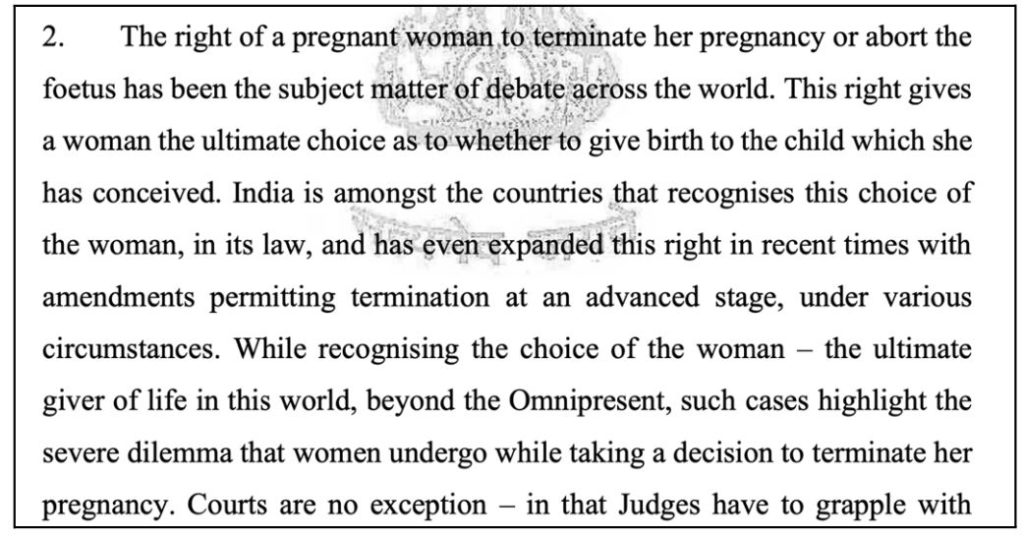
The court opined that the cases involving foetal abnormalities highlight the severe dilemma that women undergo while taking a decision to terminate a pregnancy. It observed that Section 3 (2B) of the MTP Act relaxes the conditions of the length of pregnancy in cases of substantial foetal abnormalities. However, the act does not define what constitutes these substantial foetal abnormalities. The court took note of the definitions in the abortion-related laws of other countries.
Justice Prathiba M. Singh highlighted that judicial precedents in India have supported the rights of women to abort or medically terminate the pregnancy, depending upon – the gestation period, medical condition of foetus, physical and mental health of the woman etc.
Apart from allowing for termination of pregnancy, the court also stated that the medical board has not been able to give a categorical opinion as to the degree of handicap or as to the quality of the child after birth, with certainty.
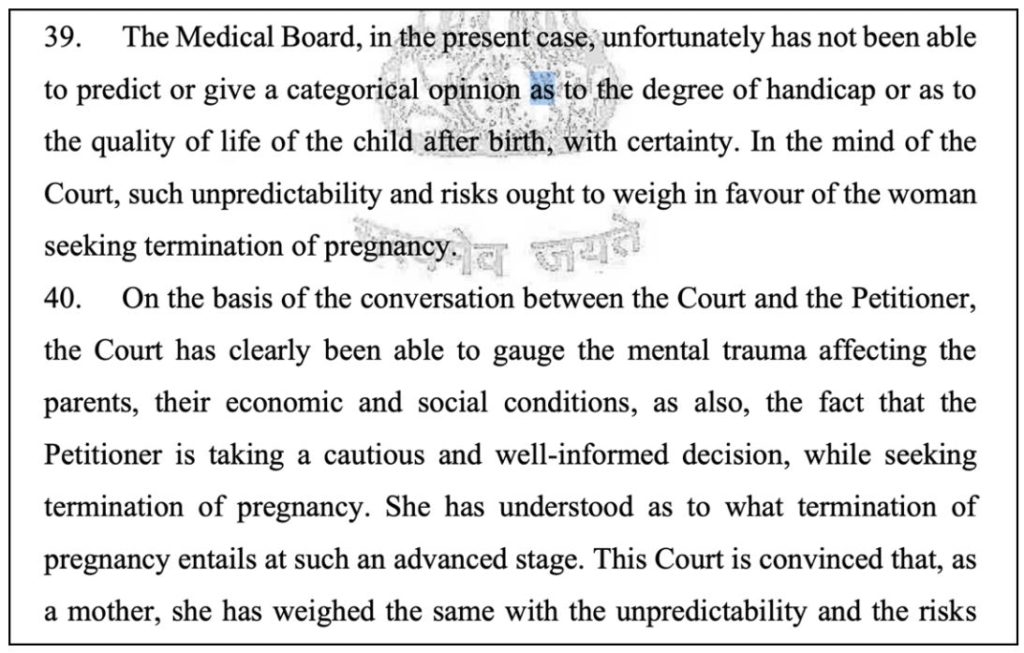
Supreme Court: Scheduled Tribe women not entitled to any ‘Right of Survivorship” under Hindu Succession Act.
As per the details of the case, Kamla Neti (D) vs. Special Land Acquisition Officer, the Land Acquisition Reference Court rejected the claim of the share of a woman in the compensation, on the grounds that as the parties belong to a Scheduled Tribe Community, the provisions of the Hindu Succession Act are not applicable. Therefore, her being a daughter shall not be entitled to the share in the amount of compensation. This view was also upheld by the Orissa High Court.
In the appeal filed with Supreme Court, the appellant relied on the case of Madhu Kishwar & Ors vs. State of Bihar & Ors, to contend that her being a daughter is entitled to a share in the compensation.

Although it struck down the appeal, the court added that there is no justification to deny the right of survivorship so far as the female member of the tribal is concerned. It urged the Central Government to consider whether it is necessary to bring a suitable amendment to Hindu Succession Act in this regard.
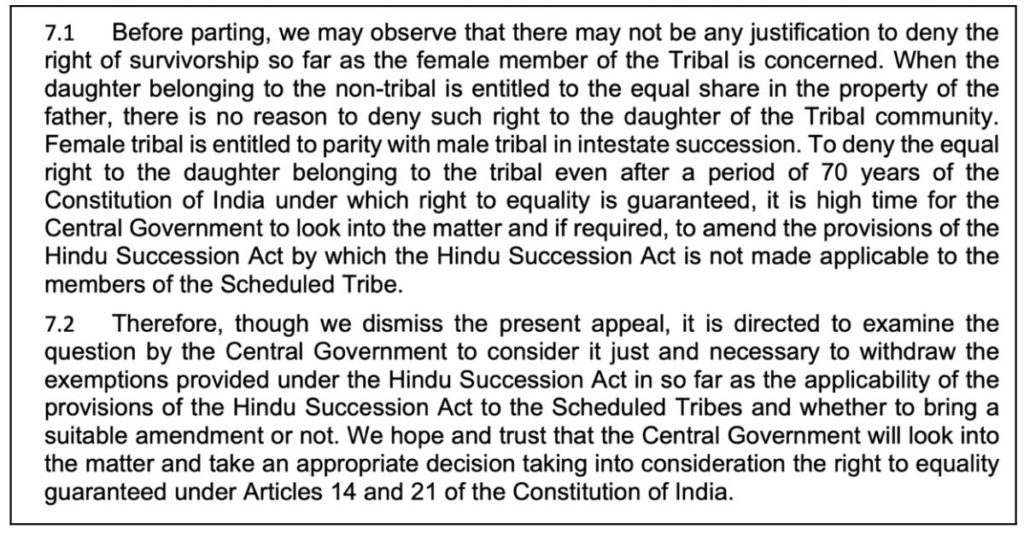
Allahabad HC: Denies bail to Rape accused stating that even if consent is presumed, willingness was absent.
Allahabad High Court looked into the definition of ‘rape as per Section 375 of IPC and observed that the offence of rape is made out even if there was consent on the part of the victim, however, if willingness was absent.
It highlighted that as per Section 375 of IPC, sexual intercourse under 7 circumstances constitute rape and these circumstances are independent of each other i.e., even if one of the seven conditions is met, an act may amount to rape.
The court was dealing with the bail plea by a man who was booked under Section 376D of IPC and 5/6 of the POCSO Act, 2012 for allegedly raping a 17-year-old girl.
As per the prosecution, the victim was in touch with the applicant through mobile chatting. On 17 January 2020, the victim was enticed away by the accused on the pretext of giving her some gifts and on the promise that they shall return within a period of one hour. He took her to a room and raped her. Two other co-accused and another unknown person also committed rape with her and threatened to kill her father and brother if she revealed their identity to anyone.
The victim contacted her father and dialled the 100 number to the police. Police retrieved her and registered the case against the accused and arrested them. However, when submitting the final report, the Investigating Officer exonerated the co-accused persons.
The accused moved to the High Court seeking bail arguing that the victim is a consenting party and highlighted other circumstantial evidence to support the claim.
The court noted that as per the final report, the conversations between the applicant and the victim do indicate proximity between the two, but it also highlights that the victim’s age falls below 18 years, which is the legal age for consent.
Therefore, even if there is consent, it is insignificant. It further stated that even is consent is presumed, willingness is absent as indicated by the medical examination report of the victim.
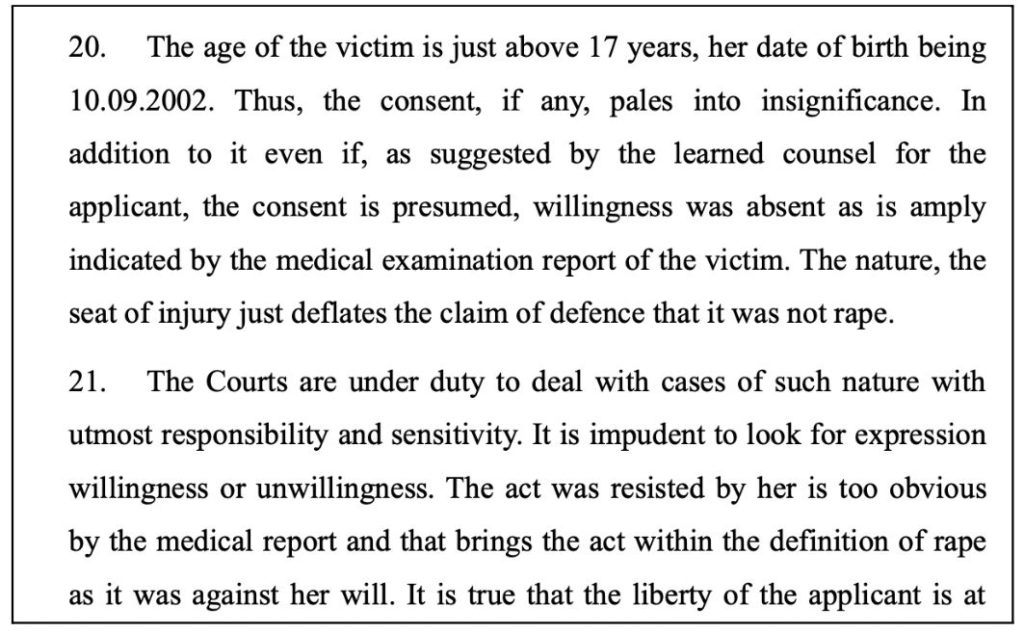
The court found the bail application devoid of any merit and dismissed the same.
Delhi HC: Landlord can’t be made to suffer indefinitely for tenant’s misconduct
In the case, Farida Begum vs. Govt. of NCT of Delhi through Dy Labour Commissioner & Anr, the Delhi High Court directed the Delhi government to de-seal a property which was sealed last year after it was found that the tenant has engaged children for his tailoring business. The court observed that the landlord cannot be made to suffer indefinitely due to the misconduct of the tenant.
The petitioner has rented out the property to a man last year. The tenant was found to have engaged children in the business of stitching/tailoring on the property. The premises was duly sealed, and an FIR was registered at Gandhi Nagar police station. During the inspection of various properties in the area, a total of 30 children were found to have been working on various premises. As per the police, the tenant is absconding.
The petitioner has argued that she cannot be made to suffer due to the misconduct of the tenant and has sought a de-sealing of the property.
The Court took cognisance of the petition of the landowner and stated that the petitioner is merely a landlady of the property and that the rent was one of the sources of income. It highlighted that there are no allegations against the petitioner of having been complicit in any manner with the tenant, and hence the petitioner ought to be permitted to use her property. The court directed the government to de-seal the property.

Madras HC: Upholds a conviction and sentence of a man in POCSO case.
Justice P Velmurugan has upheld the conviction and sentence of a person accused of kidnapping and forcibly marrying a 17-year-old girl.
He was convicted by the trial court under Sections 366 of IPC, Section 5(I) of the POCSO Act and Section 3(1)(r)(w)(i) r/w 3(2)(Va) of SC/ST Act and sentenced to rigorous imprisonment for a period of 10 years.
The counsel on behalf of the accused has referred to Vijayalakshmi & Anr vs. State by Inspector, wherein the court has observed that the legislature must take into consideration the cases of adolescents involved in relationships and should swiftly bring in necessary amendments under the POCSO Act. The argument presented as that the victim, who was between 16-18 years of age, cannot be treated as a minor.
Justice P Velmurugan stated that the opinion not to consider 17-18 year-olds under POCSO was the opinion of that judge in the case and may not be found in all cases, as the law defines that the person who has not completed the age of 18 years, is a child.
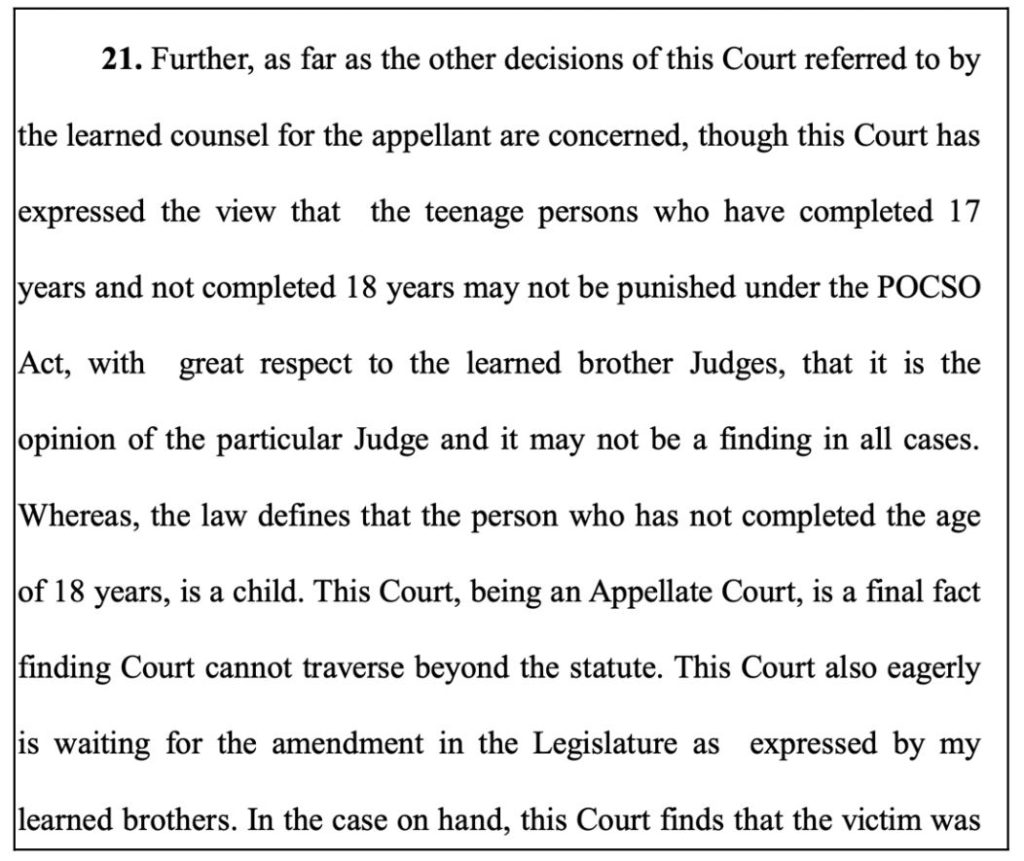
It refused to grant any relief to the convict based on this argument. It observed that the victim was a minor and was taken into custody by the appellant without her knowledge or consent of her natural guardians and proceeded to commit an assault on her. This offence falls under Section 5(I) which is punishable under Section 6 of the POCSO Act.
